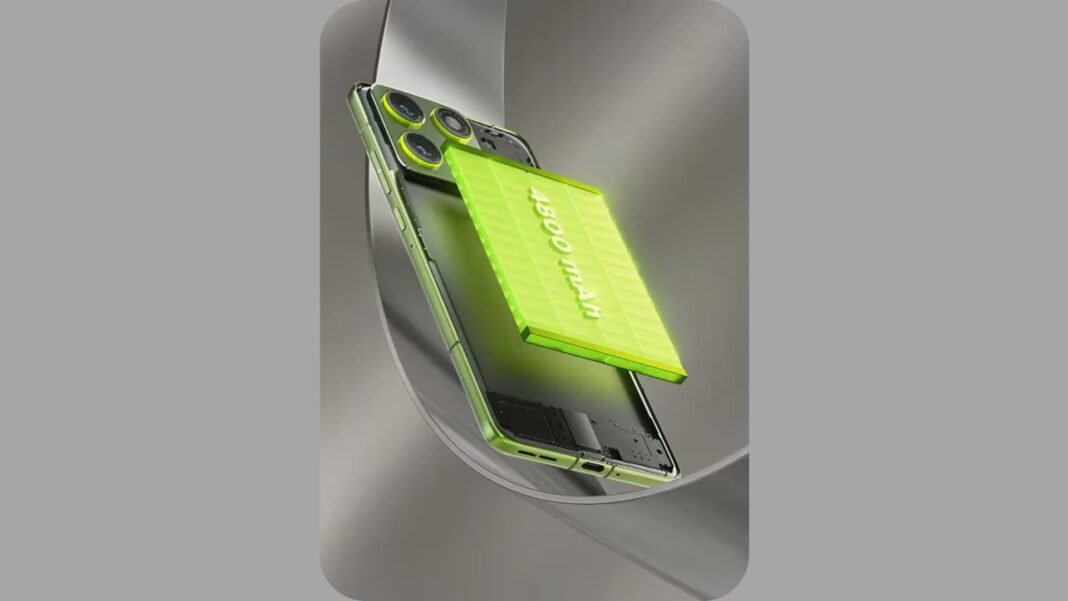Thin phones are back in style, but battery life usually pays the price. Motorola’s Edge 70 looks set to break that pattern with a 4,800mAh silicon-carbon battery in a body reportedly around the 6mm mark. Here’s what’s official, what’s likely, and how it compares to Apple’s iPhone Air and Samsung’s Galaxy S25 Edge.
Motorola has teased a 4,800mAh silicon-carbon battery for the Edge 70, a notably larger cell than the 3,149mAh iPhone Air and 3,900mAh Galaxy S25 Edge, both similarly thin. Early materials also point to 68W wired and 15W wireless charging. If battery anxiety kept you away from ultra-thin phones, the Edge 70 might be the outlier to watch.
Table of Contents
What’s confirmed so far
Battery and chemistry. Motorola’s own teaser (via its Polish site and a weekly quiz) calls out a 4,800mAh silicon-carbon battery. That’s the headline.
Charging. Retail-blog materials and listings point to 68W wired and 15W wireless. Motorola already offers this combo on prior Edge models, so it tracks. We’ll confirm at launch.
Core hardware. Expect Snapdragon 7 Gen 4 and up to 12GB RAM. Qualcomm announced 7 Gen 4 earlier this year
Silicon-carbon vs Li-ion why it matters
Silicon-carbon (Si-C) blends can store more energy per volume than standard graphite anodes, which is perfect for thin devices more capacity without making the phone thicker. Tom’s Guide sums that up well. Downsides exist: some swelling concerns, tougher manufacturing, and we’ll want to watch heat and cycle life in day-to-day use.
Edge 70 vs iPhone Air vs Galaxy S25 Edge
Context first. Ultra-thin rivals landed with small batteries: iPhone Air measures ~5.6mm (3,149mAh); Galaxy S25 Edge is ~5.8mm (3,900mAh). Review labs note workable battery life thanks to efficiency gains, but capacity is still limited. If Motorola holds 4,800mAh in a similar thickness range, that’s a material advantage on paper.
Why capacity isn’t everything. Efficiency (chip, display), thermal limits, and radio use still decide runtime. The iPhone Air’s small pack performs better than its mAh suggests, while the S25 Edge trades camera flexibility and battery headroom for thinness. Si-C might give Motorola more buffer before the battery feels tight.
Charging experience: 68W/15W in real life
If Motorola includes a 68W brick (it often doesn’t in every market), expect 20–25 minutes to ~50% as a reasonable ballpark based on similar-capacity Moto phones. Wireless at 15W is convenient; Qi2 compatibility is likely but not explicitly confirmed—watch the launch spec sheet.
Who should consider the Motorola Edge 70?
- Commuters and frequent travelers who want a slim phone that still survives a long day.
- Android users who like Motorola’s clean software and want more battery than other thin phones offer.
- Light-case people: if you hate bulky phones, this could be the sweet spot.
Who might skip: heavy gamers (thin frames heat sooner), camera die-hards who need a telephoto, or anyone who needs guaranteed two-day battery with hotspotting and 5G maps all day.
Ownership tips for ultra-thin phones
- Use a thin TPU case or a skin; avoid thick mags with metal plates that trap heat.
- Prefer wired top-ups for speed, and keep wireless for convenience to reduce heat.
- Stop at 80–90% for routine charges; full 100% is fine before travel.
- Don’t game while fast-charging; let it breathe.
What we’re still waiting to test
- Real screen-on time vs S25 Edge and iPhone Air.
- Thermals during 68W charge cycles.
- Confirmed Qi2 status and whether a charger is in the box in each region.
- Camera and display trade-offs vs battery thickness.
Featured Snippet Boxes
What is the Motorola Edge 70’s battery size?
Motorola has teased a 4,800mAh silicon-carbon battery for the Edge 70, much larger than other ultra-thin phones. Si-C chemistry can pack more energy into a slim frame, which may translate to longer runtime without making the phone thicker.
What is the Motorola Edge 70’s battery size?
Motorola has teased a 4,800mAh silicon-carbon battery for the Edge 70, much larger than other ultra-thin phones. Si-C chemistry can pack more energy into a slim frame, which may translate to longer runtime without making the phone thicker.
Is silicon-carbon better than lithium-ion?
Silicon-carbon anodes increase energy density, ideal for thin designs. You may get more capacity in the same volume, but watch for potential heat and swelling trade-offs and how manufacturers tune charging to protect cycle life.
Is silicon-carbon better than lithium-ion?
Silicon-carbon anodes increase energy density, ideal for thin designs. You may get more capacity in the same volume, but watch for potential heat and swelling trade-offs and how manufacturers tune charging to protect cycle life.
Edge 70 vs iPhone Air vs Galaxy S25 Edge battery life
On paper, Edge 70 (4,800mAh) beats iPhone Air (3,149mAh) and S25 Edge (3,900mAh). Real life depends on efficiency and tuning, but the capacity head start is clear for Motorola’s thin phone.
Does the Edge 70 support fast charging?
Early materials point to 68W wired and 15W wireless. Expect quick top-ups if the right charger is used; we’ll confirm exact times and in-box accessories at launch.
Frequently Asked Questions (FAQs)
When is the Motorola Edge 70 launching?
Teasers point to Nov 5, 2025 (Poland), with weekly reveals leading up.
How thin is the Edge 70?
It’s teased as sub-6mm; precise thickness and weight should be official at launch.
Is silicon-carbon safe?
It’s used in EVs and some consumer batteries; as with any chemistry, OEM tuning matters. Tom’s Guide flags swelling as a risk to monitor.
Does it have Qi2 wireless charging?
15W wireless is referenced; Qi2 is not explicitly confirmed yet.
How does it compare to iPhone Air and S25 Edge on battery?
4,800mAh vs 3,149mAh and 3,900mAh respectively, with similar thinness.
What chip is inside?
Snapdragon 7 Gen 4, announced May 2025.


